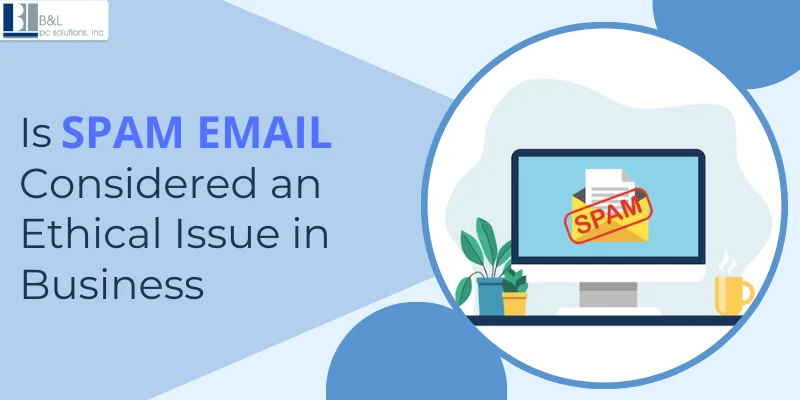
Spam or unsolicited bulk email is a popular phenomenon in the business world. It clutters inboxes, wastes time, and can even pose protection dangers. But before that, it causes inconveniences whenever you look in your inbox, and junk email raises significant ethical issues.
In this blog, we will examine whether spam email is considered an ethical issue in business, its implications, guidelines, and the moral issues surrounding unsolicited communications.
What is Spam Email?
Whenever an organization or an individual sends unsolicited messages, they are considered spam emails, typically for advertising or advertising and marketing purposes. Big and small businesses send spam emails to sell merchandise, generate leads, and grow income. When recipients see these emails, they experience frustration and mistrust.
Common Traits of Junk Emails Include:
-
Lack of recipient consent
-
Generic or misleading situation lines
-
Overuse of promotional language
-
Disguised sender identity
-
Poor concentration on and beside-the-point content material.
While a few businesses argue that email marketing is a cost-effective way to attract potential customers, the ethical issues of spamming are not well-known.
Read More Blog: What Does 'CC' Mean In An Email, And How Does It Work?
The Ethical Issues of Spam Email
Below is the list of 5 ethical issues of spam email in business:
1. Violation of Consent and Privacy
One of the main ethical issues of spam email is the violation of consent and privacy. Ethical business communication primarily involves getting recipient consent before sending marketing emails. Sending unsolicited emails disregards this precept and infringes upon personal boundaries.
Many users sense that junk email invades their virtual area and violates privacy rights. Ethical marketing and advertising practices require organizations to appreciate people's selections and send emails to those who've opted to acquire them.
2. Misleading and Deceptive Practices
Spam emails commonly use deceptive techniques to entice readers to open them, including misleading problem lines, faux sender addresses, and overstated guarantees. This poses intense ethical considerations because deceiving clients goes against the standards of honesty and transparency in business.
For example, some unsolicited mail emails employ clickbait problem traces like "Urgent: Your Account Has Been Suspended" to get readers to click. Such strategies ruin patron belief and harm a company's reputation for a long time.
3. Negative Impact on Productivity
Spam emails aren't simply an annoyance; they also lessen the place of job productiveness. Employees receiving dozens of junk mail emails daily waste treasured time sorting through inappropriate messages. This disrupts workflow and overall performance and, in the end, affects organizational operations.
From an ethical point of view, organizations that interact in spamming contribute to agencies' inefficiency. Ethical advertising and marketing must focus on adding cost as opposed to causing disruption.
4. Environmental and Economic Costs
Every email sent consumes energy, whether through server processing or data transmission. Spam emails are often deleted without being read and contribute to unnecessary energy intake and carbon emissions. On a vast scale, spam emails have a tangible environmental impact.
Additionally, agencies that rely on spam email regularly spend assets on ineffective campaigns that do not yield significant returns. Instead of investing in moral and centered advertising strategies, they create an oversaturated and unnecessary environment.
5. Cybersecurity Risks
Spam emails often mention phishing attacks, malware verbal exchanges, and scams. Cybercriminals use junk mail processes to trick receivers into disclosing sensitive information, including passwords and bank data.
From a moral perspective, corporations that engage in unsolicited mail and email advertising might also inadvertently put recipients at risk. A business enterprise's moral duty is to ensure that marketing practices do not expose purchasers to cybersecurity threats.
Related Blog: How to Recall an Email in Outlook: A Step-by-Step Guide
What are the Regulations and Legal Considerations for Spam Emails?
Diverse rules have been enacted worldwide to address the ethical and prison worries of unsolicited mail email.
Businesses need to follow these laws to avoid penalties and preserve ethical requirements.
1. CAN-SPAM Act (United States)
The CAN-SPAM Act of 2003 unites regulations for industrial electronic mail, which include:
-
Prohibiting misleading problem strains and fake sender information
-
Requiring a smooth choose-out mechanism
-
Mandating the inclusion of a bodily copy in emails
Violating the CAN-SPAM Act can bring about hefty fines, reinforcing the significance of ethical electronic mail marketing practices.
2. GDPR (European Union)
The General Data Protection Regulation (GDPR) establishes strict hints for managing personal data, including email marketing. Under GDPR, corporations need to:
-
Obtain explicit consent before sending advertising emails.
-
Provide clean privacy policies and decide on alternatives.
-
Secure personal information from unauthorized entry.
Failure to comply with GDPR can result in extreme monetary penalties, making ethical email marketing a moral responsibility and a prison requirement.
3. CASL (Canada)
Canada’s Anti-Spam Legislation (CASL) is one of the strictest anti-spam laws in the world. It requires businesses to:
-
Obtain previous consent before sending commercial emails.
-
Discover the sender and provide accurate touch statistics.
-
Allow recipients to unsubscribe effortlessly.
CASL underscores the ethical significance of permission-based email marketing.
Read More Blog: How to Add a Shared Mailbox in Microsoft 365 (Outlook Desktop App & OWA)
Conclusion
Spam email is undoubtedly a moral issue in enterprise. It violates privacy, misleads clients, reduces productivity, contributes to environmental harm, and exposes recipients to cybersecurity risks. While a few businesses may additionally see direct mail as a straightforward advertising and marketing tool, the long-term effects usually outweigh the short-term income. If you have similar concerns, connect with BLPC for Cybersecurity Services on Long Island.
Ethical email advertising entails obtaining consent, supplying valuable content, respecting client choices, and fostering trust and long-term consumer relationships. Businesses prioritizing ethical advertising best observe legal guidelines and enhance their logo recognition and purchaser loyalty.
In a world where digital conversation is essential, moral business practices should guide advertising efforts. The question is not whether unsolicited electronic mail is an ethical issue—it virtually is. Instead, agencies must ask themselves: How can we have compelling and ethical customer interactions?
Tags: Common Traits of Junk Emails, Ethical Issues of Spam Email, What is Spam Email





